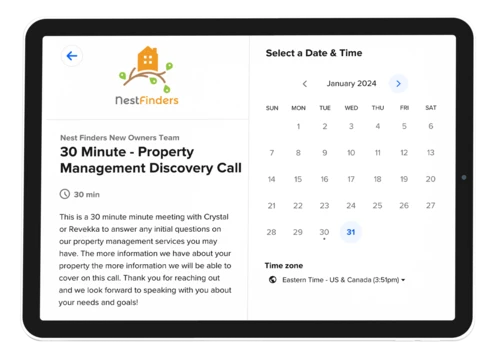For property owners, keeping their rental property in excellent condition is crucial for a successful and profitable investment. Regular rental inspections not only maintain the quality of your property but also help maximize your rental income.
A thorough landlord inspection, guided by a rental inspection checklist, allows you to assess the condition of the rental property and address any potential issues before they escalate. This comprehensive list helps you stay proactive, ensuring that your investment remains well-maintained and tenants enjoy a safe, comfortable living space.
In this article, we’ll discuss the importance of regular property inspections and provide a landlord’s checklist to guide you through the process. Let’s get down to it!
Significance of Routine Property Inspections
A rental property inspection is important for ensuring the upkeep and safety of a rental unit. It benefits both property managers and tenants. A well-structured checklist ensures that every aspect of the property is covered.
Routine inspections allow for regular monitoring of the property's condition, ensuring rent payments are accounted for and the property remains safe for tenants. During the inspection process, a detailed checklist is vital for thoroughly assessing the property. Inspections may cover everything from the condition of air filters and smoke alarms to the front door and gas leaks.
Walk-through inspections are especially important at two junctures: a move-in inspection when a new tenant moves in and a move-out inspection when a tenant leaves. These inspections help track existing damage and ensure the security deposit is handled fairly. Properly conducting inspections can also identify needed repairs and maintenance issues early on, preventing them from turning into larger, more costly problems.
It's essential to inform tenants before an upcoming inspection, giving proper notice according to tenant rights and the tenancy agreement. This ensures that both tenants and landlords are aware of the property details and any necessary repairs. Property managers should also pay attention to signs of normal wear or water damage and report maintenance issues as they arise to keep the property in good condition.
In cases of move-out inspections, a thorough inspection report is generated to document the property's condition, compare it to its state at move-in, and ensure the tenants adhere to the lease agreement.
By following a well-organized property inspection checklist and staying diligent with regular inspections, landlords can stay organized and ensure their property remains in excellent shape. This process also helps maintain healthy relationships with renters by ensuring their living space is safe and functional, meeting the standards outlined in the lease terms.
Regular inspections help catch potential problems early, from smoke detectors and carbon monoxide alarms to the HVAC system and appliances. It also ensures the property complies with local laws. Properly maintaining key safety features, alongside necessary repairs, ensures that both the tenant's and landlord's interests are protected throughout the tenancy.
A Landlord’s Checklist for Property Inspections
Here’s a comprehensive checklist to help you conduct a thorough property inspection:
1. Exterior Inspection
- Roof and Gutters: Check for signs of damage, missing shingles, leaks, or clogged gutters.
- Siding and Walls: Look for cracks, peeling paint, or signs of water damage.
- Windows and Doors: Ensure they open and close properly, check for broken glass or damaged seals, and verify that locks are functioning.
- Landscaping: Inspect the condition of the lawn, trees, and shrubs. Ensure that landscaping is well-maintained and free of debris.
- Driveway and Walkways: Check for cracks or other damage that could pose a safety hazard.
- Fencing: Ensure that fences are secure and in good condition.
2. Interior Inspection
- Walls and Ceilings: Look for cracks, stains, or signs of water damage.
- Floors: Check for signs of wear and tear, loose floorboards, or water damage.
- Doors and Locks: Ensure all interior doors open, close, and lock properly.
- Windows: Check for drafts, broken glass, and proper function. Ensure that window locks are secure.
- Plumbing: Test faucets, showers, and toilets for proper function and look for any leaks or signs of water damage around plumbing fixtures.
- Electrical: Test light switches, outlets, and smoke detectors. Ensure that all electrical outlets and appliances are functioning safely.
- HVAC System: Check for proper function of heating and cooling systems. Replace air filters if needed.
- Fire Safety: Ensure that smoke detectors and carbon monoxide detectors are working and have new batteries. Check fire extinguishers if applicable.
- Pests: Look for signs of pests such as insects, rodents, or other infestations.
3. Tenant Compliance
- Unauthorized Pets: Verify that no unauthorized pets are being kept on the property.
- Smoking: Ensure that the property remains smoke-free if smoking is prohibited.
- Alterations: Check for any unauthorized modifications to the property, such as painting or renovations.
- Cleanliness: Ensure the tenant keeps the property reasonably clean and free from excessive clutter.
4. Safety and Security
- Locks and Security Systems: Test all exterior and interior locks. Ensure any installed security systems are operational.
- Stairways and Railings: Check that stairways and railings are secure and free from damage.
- Safety Hazards: Identify any safety hazards that could pose a risk to tenants, such as loose carpeting, exposed wires, or tripping hazards.
Understanding the Local Legislation
It is essential to secure the tenant's consent before performing routine inspections. The tenant's right to privacy must be upheld to avert legal consequences. State regulations stipulate that landlords or managers must provide tenants with "reasonable notice," which is at least 24 hours.
The tenants are entitled to their right to privacy. Still, the landlord also retains some access to the property to conduct safety inspections, evaluate repair requirements, verify system functionality, and assess the overall maintenance of the property.
Acquainting oneself with the statutes and rules on rental property inspections in your locality is essential. Therefore, engaging a property manager to assist with legal affairs is advantageous.
Bottom Line
Regular property inspections are essential for safeguarding the value of a rental property, ensuring tenant safety, and maintaining positive landlord-tenant relationships.
By identifying maintenance issues early, adhering to local regulations, and keeping properties in optimal condition, landlords can prevent costly repairs, protect their investments, and provide tenants with a secure, comfortable living environment.
Regular inspections not only preserve the integrity of the property but also foster trust, ensuring that both parties fulfill their responsibilities under the lease. In the long run, consistent inspections benefit everyone involved.
Our team of highly experienced professionals at Nest Finders will guide you through your landlord journey. Ease your worries by calling us to schedule an appointment with our experts!
Additional Resources
Jacksonville Rentals: 3 Common Eviction Causes Explained
Top 3 Reasons for Tenant Criminal Background Checks in Jacksonville, FL




